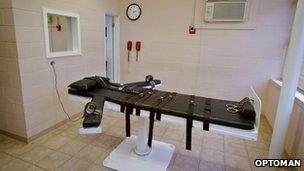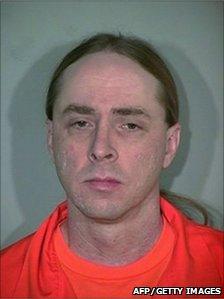US lethal injection drug faces UK export restrictions
- Published

Sodium thiopental: Induces coma during executions
Business Secretary Vince Cable has restricted the export of a drug used to execute prisoners in the United States.
The decision, which reverses the UK government's previous position, came amid a legal battle over sodium thiopental manufactured in Europe.
Mr Cable's lawyers had told the High Court they couldn't stop exports because the drug had legitimate uses.
However, he changed that position after seeing evidence that the drug was only being exported for use on death row.
Mr Cable said: "In light of new information I have taken the decision to control the export of sodium thiopental. This move underlines this government's and my own personal moral opposition to the death penalty in all circumstances without impacting legitimate trade."
The Department for Business, Innovation and Skills said the order controlling exports of the drug would be made as soon as practicable. Once in force, any person exporting this drug will need a licence issued by the government's Export Control Organisation, external.

Landrigan's execution was delayed by a shortage of a lethal injection drug
Sodium thiopental, an anaesthetic, is used in a massive dose to induce a coma in condemned prisoners, before two other drugs are used to kill them.
But US prison authorities have been struggling to secure sufficient supplies and turned to Europe for further consignments.
In October, the US state of Arizona revealed it had executed one of its death row inmates, Jeffrey Landrigan, after receiving a consignment of the drug from the UK.
Reprieve, a legal charity which campaigns against death row, intervened after being contacted by lawyers for two death row inmates, Ralph Baze in Kentucky, external and Edmund Zagorski in Tennessee, external.
Mr Cable initially said he could not restrict exports, external - but lawyers from Leigh and Day, working with Reprieve, subsequently established that no European supplies to the US were being used in medicine - meaning that they were only going to death row.
Furthermore, one of the manufacturers identified in the legal action said it did not oppose the government imposing export restrictions.
Clive Stafford Smith, director of Reprieve, said: "All politicians should be congratulated when they admit a mistake, and it is a credit to Vince Cable that he has backed down.
"However, there is urgent work to do. The California Department of Corrections and Rehabilitation... expects to receive enough drugs to kill 86 people this week, perhaps as early as today, probably again from Britain.
"The British government must take active and urgent steps to prevent this from happening, and to make up for the delay in imposing a ban."
The legal action before the British courts has not established the source of California's drugs - and one of the other states targeted in the action, Tennessee, has also already secured a supply of the anaesthetic.
- Published27 October 2010
- Published28 September 2010